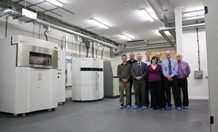Articles

The University’s new £2.6 million Centre for Additive Layer Manufacturing will harness the potential of '3D printing'.
The future of manufacturing comes to Exeter
A £2.6 million facility at the University of Exeter is set to become a leading centre for a manufacturing technique which could revolutionise the way things are made.
The Centre for Additive Layer Manufacturing (CALM) will enable businesses, entrepreneurs and researchers to harness the amazing potential of so-called ‘3D printing’.
This is a new production technique which can create complex or bespoke parts and complete products by building them up one layer at a time in specialist machines.
CALM, due to officially launch later this year, has just take delivery of a state-of-the-art machine which allows 3D printing using a type of high performance plastic which is so strong and heat resistant it can be used as an alternative to metal.
The EOSINT P800 is the only machine in the UK which can manufacture high performance thermoplastics (for example, PEEK and PEK) through the additive layer process, opening up a whole new realm of possibilities for businesses.
Dr Sara Flint, Commercial Manager for CALM, said: “Additive layer manufacturing allows you to design and make things that were impossible to make before. You can make complex components or reduce something that used to be made from several parts to just one piece.
“There are so many practical applications for it and yet it’s a new and developing area. There are huge opportunities to innovate and improve existing products by making them lighter, stronger, or more efficient.”
The manufacturing technique has created global interest and work at other facilities has already seen products as diverse as a complete working clock and a violin created from scratch. Major areas of interest include making medical implants, to aerospace components or even high-end parts for F1 cars.
One of the key advantages the technique offers is that it makes it easier, cheaper and quicker to make prototypes and ready for market products because it simplifies the manufacturing process. It also has potential environmental benefits, as the additive layer manufacturing process wastes much less material – making it very efficient.
Professor Ken Evans, Dean of the University’s College of Engineering, Mathematics and Physical Sciences, said: “Traditionally, to manufacture a part or component specific tools had to be made – which can be expensive and time consuming. Now you can design something in 3D on a screen and then effectively ‘print’ it as a working product.”
“Here at CALM we’re encouraging companies, from inventors and designers, to high tech businesses conducting large-scale research and development, to utilise our facilities and expertise to get started. We can provide technical expertise in additive layer manufacturing to businesses across all sectors.”
CALM will feature additive layer machines which can work in several materials, allowing for a huge range of possibilities in potential products.
Businesses wanting to find out more about the CALM centre and how they can use its facilities can find out more at www.exeter.ac.uk/calm
CALM is funded by the European Regional Development Fund (ERDF), South West Regional Development Agency (SWRDA), the University of Exeter, and EADS Innovation Works, based at Filton in Bristol.
CALM’s new machine which additively layers high performance polymers is the EOSINT P800. You can find out more about the machine and its capabilities here.
Or you can find out more about EOS on the EOS website.
Date: 9 June 2011
